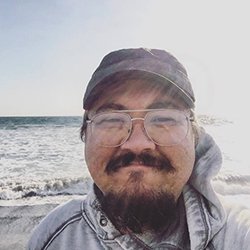by Kerry Trautman
Tonight’s September sky is busy,
and the world gazes up,
knowing only what the internet tells them,
what news anchors describe with tv graphics.
We watch the white sphere greying slowly
into its holy auburn coma,
lacking any sacrificial ritual or gods.
Seventy miles away from me
my grandmother is dying,
asking her slate-faced doctor if
she could please just lie down, please,
when in fact she hasn’t risen from
bed in two weeks, hasn’t stood
beneath the sky in at least three Julys.
My father would have wheeled
his wide computer chair out to the grass
rolling over these earliest brown leaves,
with a bottle and binoculars,
would have willed away the clouds—
whose names he knew—
obscuring everything heavenly.
My cellphone camera documents only a blotch
of somewhat-glow behind clouds where,
a moment ago, I swear I saw
that last curved sliver—like a clipped toenail—
wink through clouds, attempting to cling
to its mother body, then relenting to the black
we all can agree is there.
 Ohio born and raised, Kerry Trautman has had her work appear in various anthologies and journals such as Midwestern Gothic, Alimentum, Free State Review, The Fourth River, and Third Wednesday. In 2017, her poem “Pixie Cut” was nominated for a Pushcart Prize by the editors at Slippery Elm. Her poetry chapbooks are Things That Come in Boxes (King Craft Press, 2012), To Have Hoped (Finishing Line Press, 2015), and Artifacts (NightBallet Press, 2017).
Ohio born and raised, Kerry Trautman has had her work appear in various anthologies and journals such as Midwestern Gothic, Alimentum, Free State Review, The Fourth River, and Third Wednesday. In 2017, her poem “Pixie Cut” was nominated for a Pushcart Prize by the editors at Slippery Elm. Her poetry chapbooks are Things That Come in Boxes (King Craft Press, 2012), To Have Hoped (Finishing Line Press, 2015), and Artifacts (NightBallet Press, 2017).

 Katarina Boudreaux is a New Orleans based author, musician, dancer, and teacher. Her first novel, Platform Dwellers, is available from Owl Hollow Press. Alexithymia is available from Finishing Line Press and Anatomy Lessons from Flutter Press.
Katarina Boudreaux is a New Orleans based author, musician, dancer, and teacher. Her first novel, Platform Dwellers, is available from Owl Hollow Press. Alexithymia is available from Finishing Line Press and Anatomy Lessons from Flutter Press. John Nizalowski is the author of four books: the multi-genre work Hooking the Sun; two poetry collections, The Last Matinée and East of Kayenta; and Land of Cinnamon Sun, a volume of essays. Nizalowski has also published widely in literary journals, most notably Under the Sun, Weber Studies, Puerto del Sol, Slab, Measure, Digital Americana, and Blue Mesa Review. Currently, he teaches creative writing, composition, and mythology at Colorado Mesa University.
John Nizalowski is the author of four books: the multi-genre work Hooking the Sun; two poetry collections, The Last Matinée and East of Kayenta; and Land of Cinnamon Sun, a volume of essays. Nizalowski has also published widely in literary journals, most notably Under the Sun, Weber Studies, Puerto del Sol, Slab, Measure, Digital Americana, and Blue Mesa Review. Currently, he teaches creative writing, composition, and mythology at Colorado Mesa University.